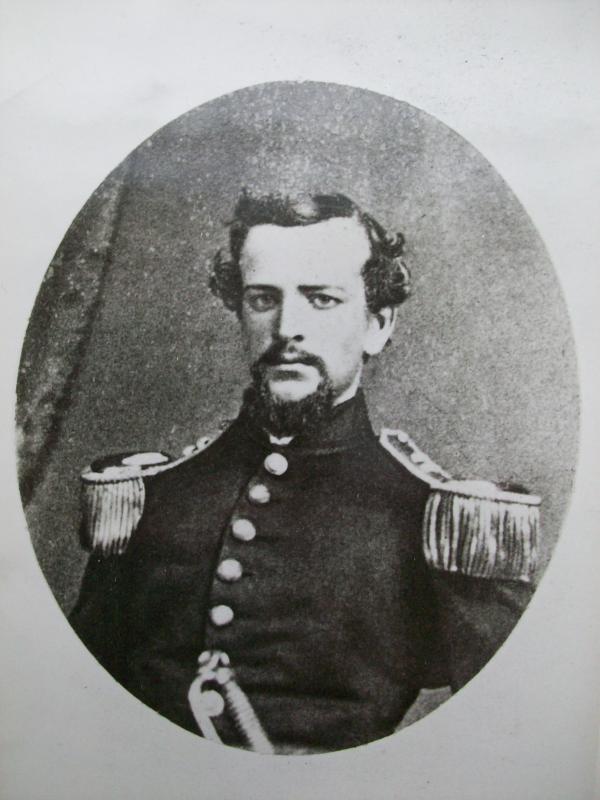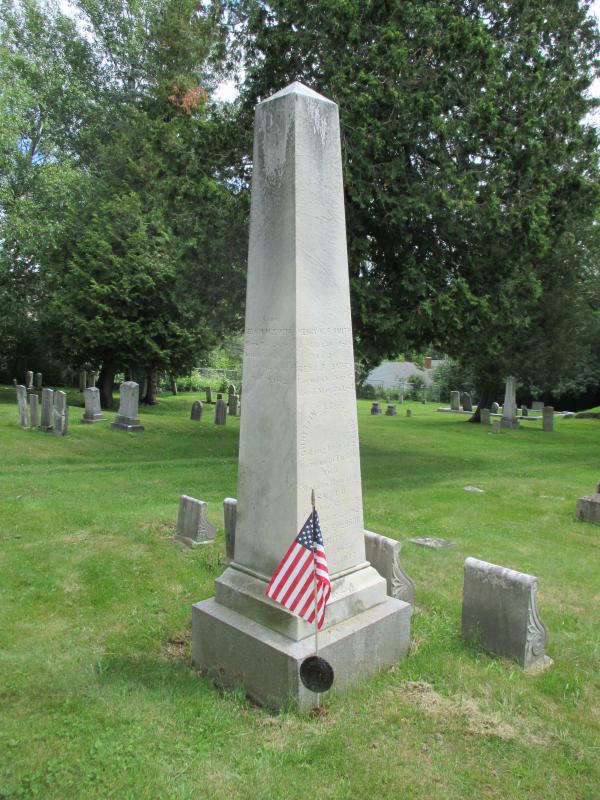A story of bravery and sacrifice during the American Civil War
In commemoration of the 150th anniversary of the end of the Civil War it’s important to remember the men who fought and those who gave their lives in the conflict between North and South. This is the story of Capt. Edwin M. Smith of Wiscasset.
At the start of the war in the spring of 1861, after news was received of the fall of Fort Sumter and President Lincoln’s call for troops, the Wiscasset Board of Selectmen called an emergency meeting and passed the following declaration:
“We cordially endorse this call upon our Fellow Citizens. Let us come as one man to the support of the Administration. All party lines are obliterated. There is but one text: The “Union” – “the Constitution” and The “Enforcement of the Laws.”
This document was signed and dated April 25, 1861. At the same meeting, the selectmen announced a “Citizens Meeting” at Wawenock Hall for 7 p.m., Saturday, April 27. The stated purpose of the assembly was for the citizens of Wiscasset and vicinity to “give expressions of their loyalty and attachment to the Constitution and Union and to adopt such measures as may be deemed advisable in the present crisis of our Nation.”
There’s a copy of the town meeting’s proceedings on file in the Archives Room of the Wiscasset Public Library on High Street.
Among the names mentioned in the minutes is Edwin M. Smith, a Wiscasset native who lived on High Street, a few doors down from the Lincoln County Courthouse.
Smith was just 22 years old when the first shots were fired at Fort Sumter. He had studied law at Bowdoin College and had just recently returned home to Wiscasset from a trip to Europe.
He was well known around town, a son of the honorable Samuel Emerson Smith who had served as Maine’s governor from 1831 through 1834.
During the town meeting when a call was made for volunteers, Edwin Smith was the first to come forward and swear both his allegiance to the Constitution and his willingness to fight and lay down his life if need be to preserve the Union. He soon became the unanimous choice to raise a company of Wiscasset recruits, and did so with the help of his close friends, Gustavus Rundlett and William Henry Clark.
Within days, Company G was formed and Edwin Smith chosen as its captain. Company G became a part of the 4th Maine Regiment. It was just a few months later, on July 21, 1861, that Capt. Smith and the other Wiscasset volunteers found themselves in the first bloody clash of the war at Manassas, Virginia. This fighting ended in an inglorious and frenzied retreat of the Union Army.
Not all of the Yankees turned tail and ran at the battle of Bull Run. Capt. Smith was one of those who’d kept a cool head in the face of the enemy. After the order was given to retreat, he stood his ground, firing his revolver at the pursuing Rebels and barely escaped with his life. Capt. Smith’s bravery under fire didn’t go unnoticed, drawing the praise of his comrades as well as the attention of his superiors. Shortly thereafter, he was offered the rank of major but turned down the promotion, choosing instead to remain with his commander, Gen. Hiram G. Berry.
He soon became a trusted member of the general’s staff, serving as assistant adjutant and eventually was elevated to chief of staff. It’s from a biography of Gen. Berry’s life that we learn a great deal more about young Capt. Smith and his legacy.
Hiram Berry also hailed from Maine from the city of Rockland where he’d served as mayor. When war was declared, he traveled to Augusta and offered his services to the governor. He helped raise and organize a regiment made up of recruits from Maine’s Midcoast, including Edwin Smith and the other Wiscasset recruits.
In the spring of 1862, the Army of the Potomac began a new offensive called the Peninsula Campaign. Union troops including Gen. Berry’s charges were ordered south into Virginia, the goal being to take Richmond (the Confederate Capital) thus bringing an end to the war.
Hero of the Day
At Williamsburg, Virginia, one of the first major battles of the campaign, Capt. Smith would once again distinguish himself. Coming to the aid of Gen. Joseph Hooker’s troops, Gen. Berry’s brigade undertook a spirited counterattack and recaptured both territory and artillery yielded to the enemy.
Rallying the men under his command, Capt. Smith led a daring charge against a Rebel stronghold, overrunning the enemy position. Dashing forward on horseback, his sword drawn, he spurred his mount over the enemy’s rifle pits into the thick of the fighting. Four Rebel bullets tore through his uniform, but Capt. Smith miraculously escaped injury.
After the smoke had cleared he was hailed as the “hero of the day” and introduced to General Philip Kearny, who mentioned the young officer’s bravery in a dispatch to Union headquarters. That night by the campfire Edwin Smith made the following entry in his journal, “We stood in arms amidst the enemy’s dead and dying, cold, wet and weary enough.”
General Berry’s brigade wouldn’t be as fortunate in its next engagement with the Confederates. The ground fought over was swampy and thickly wooded, at a place called Fair Oaks. It was here on May 31st when the fighting was fiercest that Capt. Smith laid down his life for his country.
Again, casting thoughts of personal safety aside, he led a gallant charge of the 5th Michigan volunteers and was killed instantly when a Rebel bullet struck him in the temple.
General Berry was badly shaken after receiving news of his young officer’s death. “Better that I had lost a hundred men than that brave boy,” he told his subordinates. The general ordered Major H.L. Thayer, a staff officer, to mark the spot where Smith had fallen so that his body might be recovered after the fighting ceased.
That same day after dark, Major Thayer and three volunteers returned to the wooded swamp where their dead comrade lay. There they carefully placed his body in an army blanket and carried it back through an orchard to their encampment, a distance of about three miles.
The following morning, Capt. Smith’s remains were placed in a field ambulance and carried to the river to a waiting vessel. Afterwards Major Thayer was quoted as saying, “Advance pickets from the enemy were already firing on us from the further side of the orchard, this spot was hurriedly abandoned, except by some surgeons and their assistants, who volunteered to remain with the wounded.”
This last comment suggests these soldiers must have loved and deeply respected Capt. Smith to risk their lives in retrieving his mortal remains.
Edwin Smith had written many letters home. One had told how he missed seeing the purple and white lilacs in bloom from his bedroom window. Among the last pages of his journal was this poignant entry made the night before he marched into battle.
“And now, having arranged for the disposition of my worldly estate, I must say that, possessing a full confidence in Christian religion, and believing in the righteousness of the cause in which I am engaged, I am ready to offer my poor life in vindicating that cause, and sustaining a government the mildest and most beneficent the world has ever known.”
Laid to Rest with Honors
It wasn’t long before word of Edwin Smith’s courageous death reached Wiscasset over the telegraph. The newspapers, including the Boston Journal, told of Capt. Smith’s bravery in the face of the enemy.
Hundreds of people gathered to meet his casket when it arrived home draped with the stars ’n stripes. Smith was a Mason and a member of the Lincoln Lodge in Wiscasset. Following a service at the Episcopal Church he was interred on June 19, 1862 with full military and Masonic honors. Close to 200 Masons took part in the ceremony, accompanying the casket from the church to the cemetery where a graveside service was held.
“As a brother and patriot his loss was sincerely mourned and deeply and widely deplored,” wrote Wiscasset historian Rufus King Sewall, also a member of Lincoln Lodge.
Capt. Smith was laid to rest in the family plot at Evergreen Cemetery off Hodge Street his grave is marked with a white marble obelisk.
Capt. Edwin M. Smith’s story comes from “More Wiscasset and Its Times – Other Stories of Maine’s Prettiest Village” written by Phil Di Vece and now available on Amazon.com.
Event Date
Address
United States






























